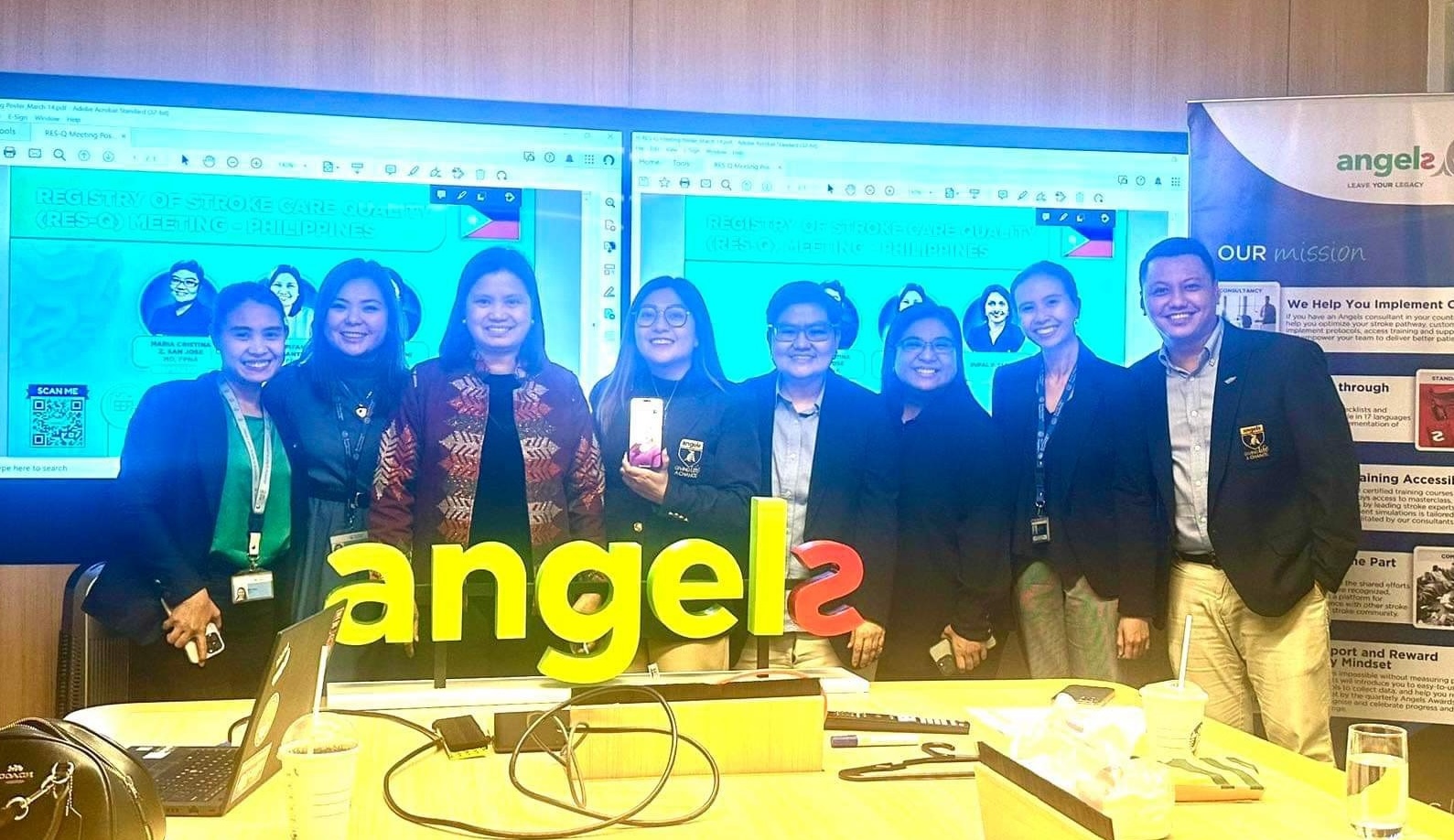
Nel gennaio del 2024, il registro di miglioramento della qualità dell’ictus RES-Q aveva una anamnesi da raccontare. Il registro stava per lanciare la nuova piattaforma pronta per il futuro a un nuovo indirizzo Web. La nuova piattaforma presentava diverse interessanti nuove caratteristiche per le quali il precedente non aveva la capacità. Queste includevano una funzione di accesso singolo per accedere a più account, una raccolta dati più intuitiva disponibile in 15 lingue, dashboard facili da usare e la possibilità di generare report su richiesta.
È stata lanciata una campagna per rendere la comunità globale per l’ictus consapevole del nuovo URL e rassicurarli che la migrazione dei loro vecchi dati inizierebbe non appena si sono registrati nuovamente sul nuovo sito.
Mentre i consulenti Angels di tutto il mondo si sono fatti avanti per aiutare gli ospedali dei loro Paesi a gestire il cambiamento, il team nelle Filippine ha individuato un’opportunità. Sono trascorsi circa otto mesi da un incontro importante a Manilla durante il quale gli ospedali attrezzati per l’ictus hanno ricevuto una formazione pratica su come, e perché, utilizzare RES-Q.
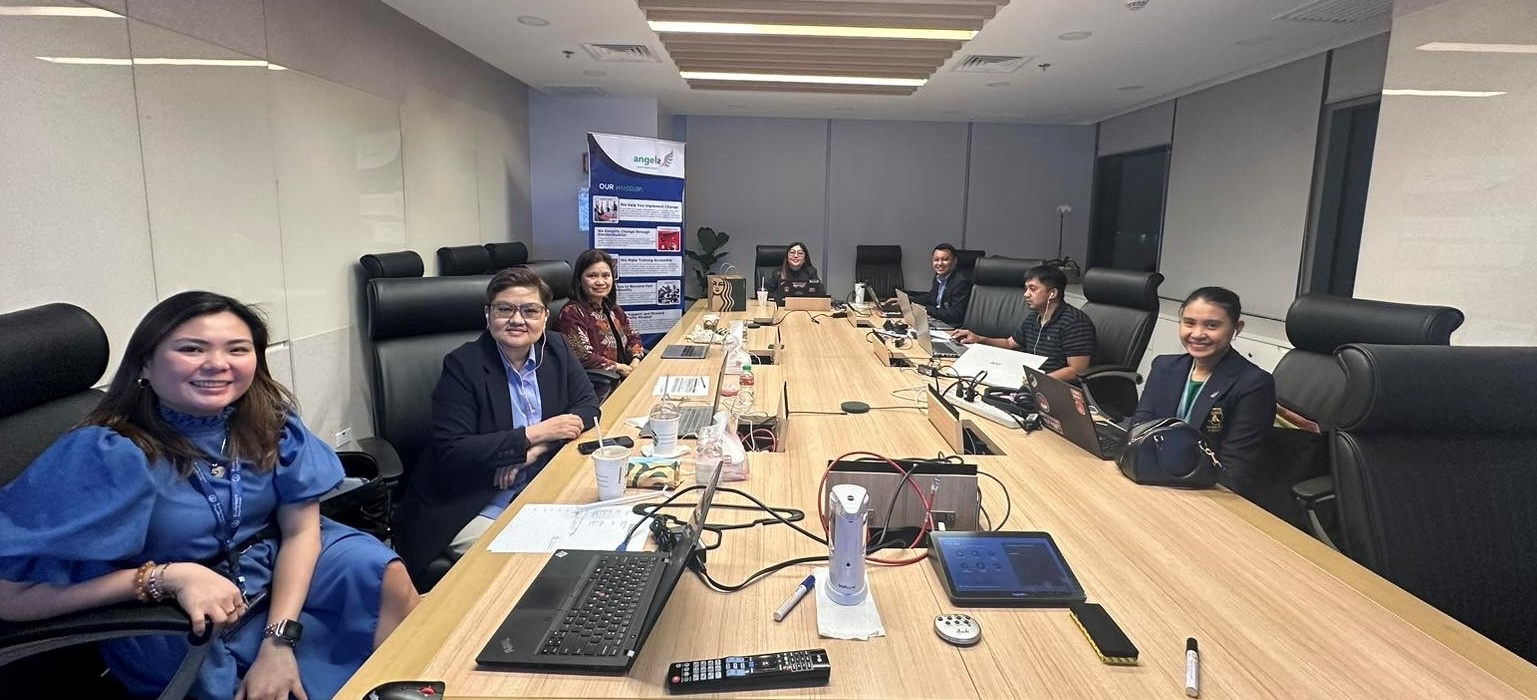
Il monitoraggio della qualità è un requisito per il programma di certificazione dell’ospedale ictus acuto Ready Hospital (ASRH) che la Società per l’ictus delle Filippine (SSP) ha avuto inizio all’inizio del 2023. L'obiettivo dell'incontro Manilla era quello di cambiare le percezioni sui processi di raccolta dei dati e, riunindo i professionisti la cura dell'ictus di 47 ospedali certificati ASRH in un unico evento, riuscivano a illuminare molte candele con una sola fiamma.
Ora il lancio del "nuovo" RES-Q ha presentato un'altra opportunità per un incontro incentrato sul monitoraggio della qualità - questa volta tenuto online per raggiungere ancora più ospedali.
Il webinar che si è tenuto la sera del 14 marzo ha portato la partecipazione di oltre 300 partecipanti che rappresentavano 75 ospedali e ha nuovamente dimostrato la sinergia tra Angels e SSP. La riunione è stata affrontata da due ex presidenti SSP che ora condividono il ruolo di coordinatore nazionale per RES-Q, le Dott.sse Maria Epifania Collantes e Maria Cristina San Jose, con una dichiarazione conclusiva dell’attuale presidente SSP, la Dott.ssa Maria Socorro Sarfati. L’evento principale è stato un passaggio virtuale della nuova piattaforma RES-Q condotta dal responsabile globale RES-Q Rupal Sedani, che si collega dalla Repubblica Ceca.
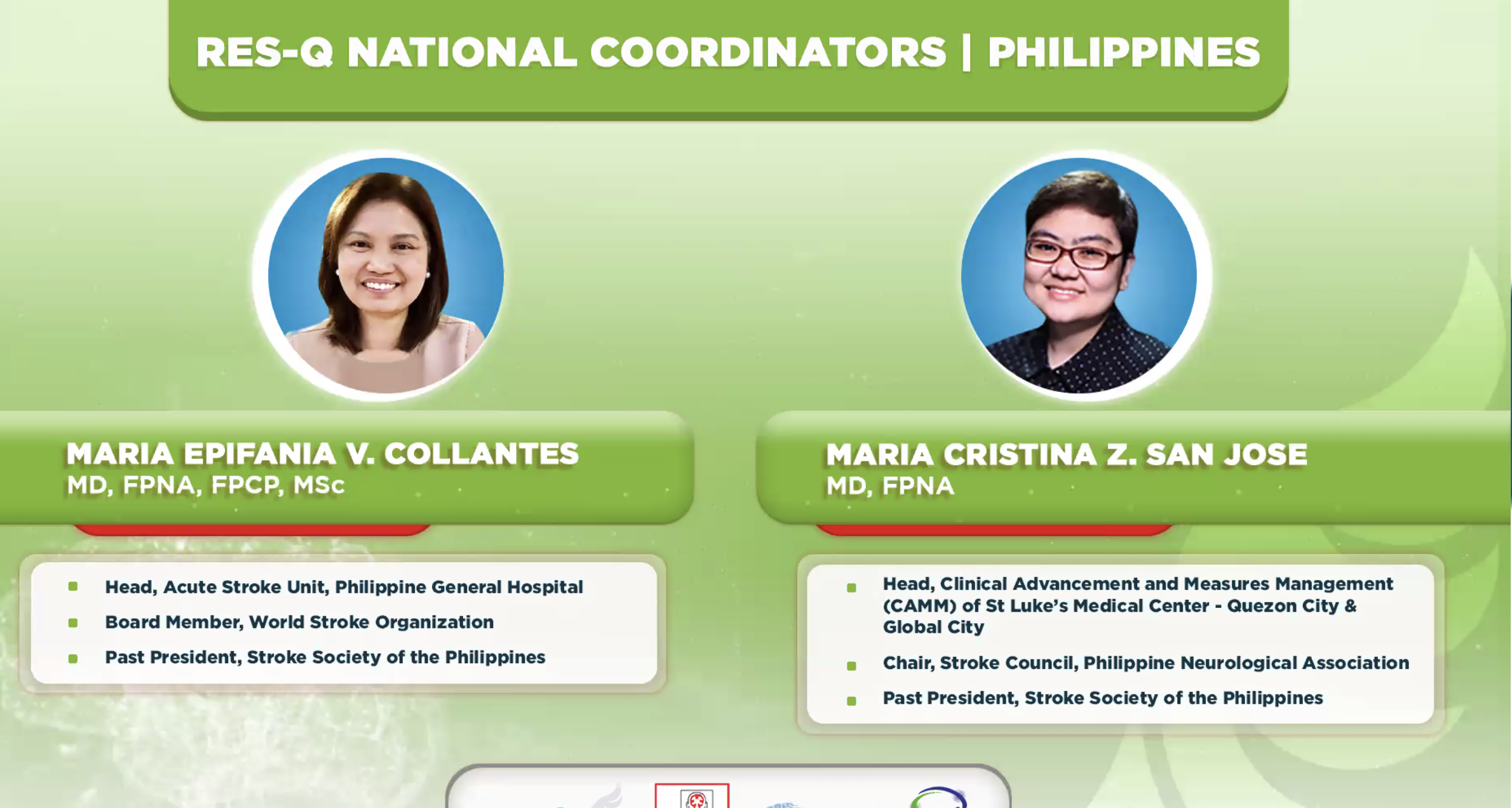
Perché il monitoraggio della qualità
Adottare RES-Q come registro nazionale è stata un’opportunità per migliorare la la cura dell'ictus fin dal principio, ha affermato il Dott. Collantes. La raccolta e l’analisi dei dati hanno prodotto benefici sia al momento della cura dei paziente sia in relazione al cambiamento della politica. Oltre a identificare le lacune e le sfide a livello ospedaliero, il monitoraggio della qualità potrebbe influire sulla politica fornendo dati sui fattori di rischio e mettendo in luce questioni come la disparità di genere e le differenze socio-economiche e regionali. Potrebbe aiutare a rivelare le cause dei ritardi del trattamento, migliorare le tempistiche e gli esiti dellictus, tracciare le tendenze e, in ultima analisi, portare a una riduzione della mortalità.
Tuttavia, è stato necessario che i dati fossero completi e accurati al fine di ottenere un quadro chiaro della la cura dell'ictus in tutto il Paese.
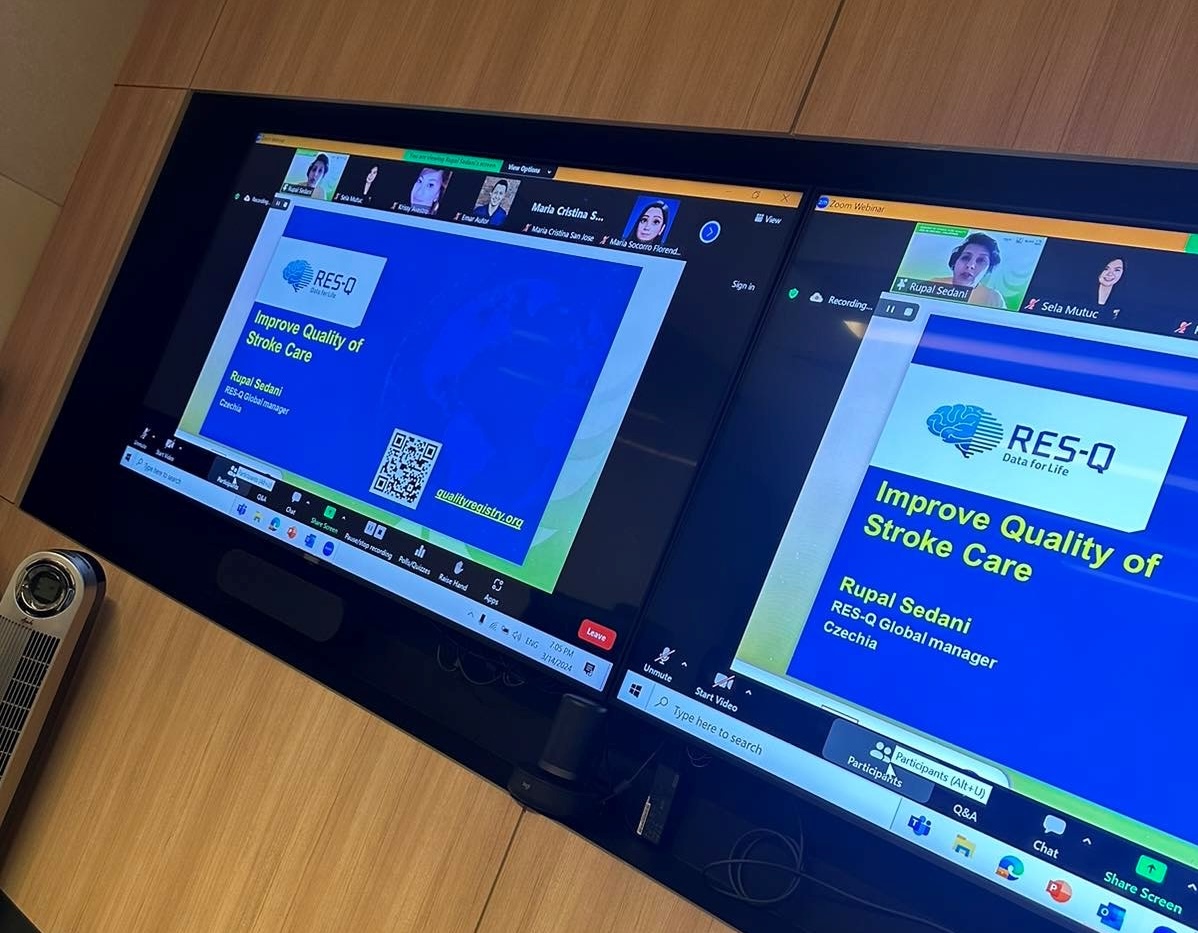
L’uso di RES-Q è stato un facilitatore chiave del miglioramento della qualità e dell’sanità basata sull’evidenza nelle Filippine, ha affermato la Dott.ssa San Jose. Il monitoraggio della qualità è stato tra le strategie principali per promuovere e integrare l’sanità basata sull’evidenza, il che significava garantire che l’intero sistema di erogazione dell’sanità fosse basato su principi basati sull’evidenza.
Il monitoraggio della qualità ha consentito una revisione sistematica delle cure rispetto a criteri espliciti, ha affermato la Dott.ssa San Jose. I dati hanno spinto e spinto il miglioramento della qualità aiutando a identificare e analizzare i problemi. Le informazioni ottenute sono state la base per il processo decisionale e la decisione portano all’azione.
La raccolta dei dati ha inoltre consentito il benchmarking e il confronto dei risultati e dei processi rispetto a quelli dei concorrenti e dei leader del settore ha alimentato l’impulso a fare meglio.
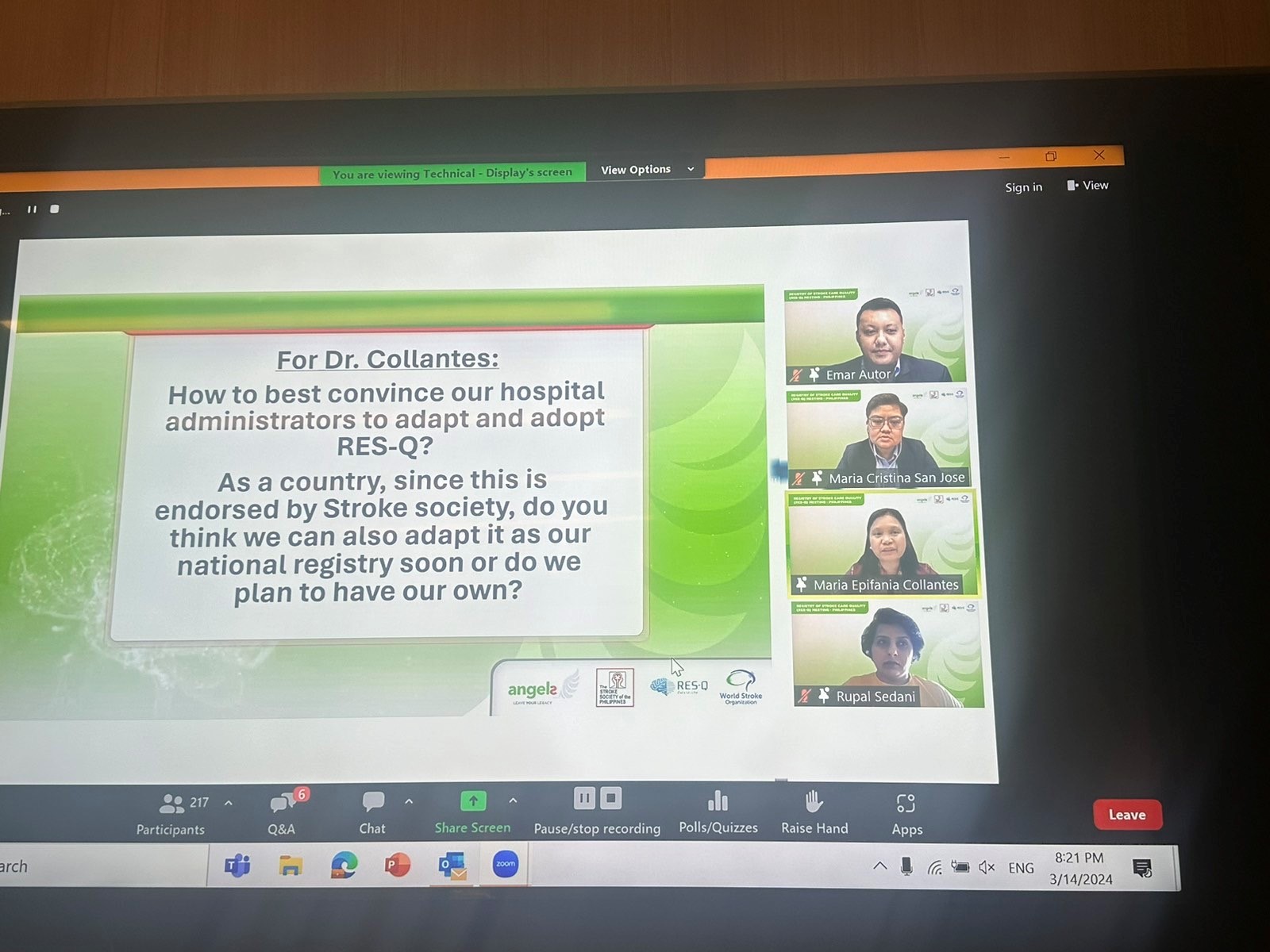
Renderla un’abitudine
Il tempo dedicato alle domande ha seguito il tour virtuale della piattaforma RES-Q migliorata e di facile utilizzo che ha portato a ulteriori approfondimenti:
D: In che modo è opportuno convincere gli amministratori ospedalieri ad adottare RES-Q?
Dott. Collantes: Parlare loro dei benefici e mostrare loro come possono essere utilizzati i dati per migliorare la la cura dell'ictus.
D: Le Filippine avranno un proprio registro?
Dott. Collantes: RES-Q è il nostro registro nazionale ictus. Viene riconosciuto a livello internazionale e fornisce feedback in tempo reale che consente il miglioramento.
D: Chi deve farsi carico del questionario RES-Q presso il nostro ospedale?
Dott.ssa San Jose: Identifica il tuo campione del cambiamento: qualcuno che si impegna a utilizzare i dati per il miglioramento della qualità.
D: Qual è la best practice per la segnalazione e la comunicazione dei risultati del monitoraggio della qualità nel vostro reparto o ospedale?
La risposta a questa domanda è stata alla base di ciò che significa impegnarsi a migliorare continuamente la qualità e a migliorare i risultati per i pazienti. Solo quattro parole, conteneva un consiglio che, se assunto dagli ospedali, avrebbe portato a termine qualsiasi attivazione del monitoraggio della qualità, compreso questo webinar, era destinata a raggiungere.
La dott.ssa San Jose non esita per un secondo: "Rendetelo un'abitudine", ha aggiunto.


